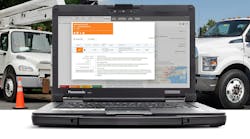Using radio frequency identification (RFID) technology to track cargo containers on a global basis can improve productivity, save money and boost security – but only if RFID systems can be standardized, according to consulting company ABI Research.
“Container tracking can deliver supply chain management benefits – both cost reductions and revenue increases – that may add up to thousands of dollars per container,” said Michael Liard, research director for the Oyster Bay, NY-based firm. “Smaller inventory, fast transportation and routing troubleshooting, lower insurance, greater efficiency and heightened security are all demonstrable advantages that RFID tracking can provide.”
The critical component to achieving those benefits, however, is RFID standardization, he cautioned. Liard pointed to a recent EPCglobal pilot project using active RFID tags along with software from Oracle and systems from Savi Technology that highlighted the importance of common standards in maximizing the benefits RFID can bring to port operations.
The pilot tagged sea-borne shipping containers traveling between Hong Kong and Japan to provide real-time tracking information to EPC Information Services (EPCIS) – a draft EPCglobal standard enabling trading partners to communicate in a common computer language on objects moving throughout the supply chain.
“The benefits [of RFID tracking] seem clear, but many vendors and end users believe that the prerequisites for greater RFID adoption in this sector are a common nomenclature for RFID data and a standard [open] framework for how that information is shared,” Liard said. “The EPCglobal pilot represents a significant step towards the practical realization of a truly useful standard, as it is the first real-world demonstration among port operators of the potential created when multiple trading partners and service providers can ‘speak the same language.’”


